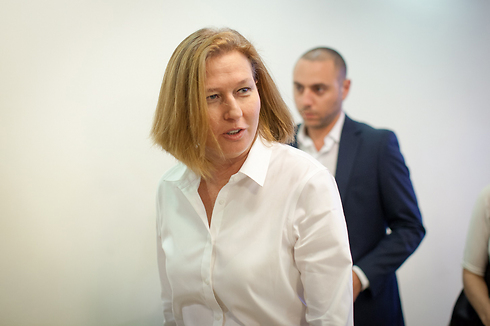Justice Minister and chief negotiator Tzipi Livni responded Monday to criticism aimed at her from government officials in wake of an informal meeting she held with Palestinian President Abbas in London a week and a half ago, saying it was in Israel's interest to find a peaceful resolution to the conflict.
Livni's meeting was Abbas was downplayed and disowned by Israeli officials, including Prime Minister Netanyahu and Foreign Minister Lieberman, who stressed that in wake of a unity agreement between Hamas and Fatah, no official Israeli contact with Palestinians was permitted.
Livni acted as Israel's chief negotiator in peace talks with the Palestinians that collapsed last month in a storm of mutual accusations. Livni's meeting with Abbas was the first meeting between officials on both sides since the talks ended as they approached an April 29 deadline. The justice minister also met in London with Kerry, who brokered the latest round of negotiations.
Related stories:
- Netanyahu: Livni meeting with Abbas unsanctioned by government
- Kerry and Abbas meet for first time since peace talks collapsed
- Op-ed: Palestinian reconciliation increases chance for peace
Responding to detractors, Livni said "We at the Hatnua (Livni's party) will continue to work for Israel's interest. The conflict continues… and it is our interest to resolve it; acting like an ostrich state is not an option for us.
"And to all those politicians who keep making noise, we announce that we will continue to promote what we believe in – and that is what I did last week in my meeting with the Palestinian Authority chairman in London."
Commenting on the looming Palestinian unity government with Hamas, which Netanyahu and others in Israel claim is bent on Israel's destruction, and thus not a partner for peace, Livni claimed Israel cannot ignore the Palestinians.
"Boycotting the other side is irresponsible. To reach a resolution we must continue with direct negotiations. (However) we cannot ignore the problematic nature of the deal reached between Hamas and Fatah, and in the regard we must understand that even if we wish to present an alternative position than we must listen to the other side."
Livni went on to slam the radical right, which it claimed wanted to turn Israel into Yitzhar, a flashpoint settlement that has been scene to a string of 'price-tag' attacks against Palestinians, Israeli-Arabs and even IDF soldiers.
"It is clear to me why the radical right does not like our presence in the government: We prevent it from turning Israel into Yitzhar.
After the meeting, Netanyahu told Livni that her meeting with Abbas in London was not an official government summit, sources in the Prime Minister's Office said last Saturday.
The prime minister had clarified to Livni that "in this kind of meeting, she only represents herself and not the Israeli government," the sources said.
Lieberman also downplayed the relevance of the meeting, in comments to the Israeli media Saturday.
"I assume that she (Livni) was in London privately and met whoever she wanted to meet," Lieberman told Channel 2 television. "I'm sure that this wasn't a meeting for peace talks. Even if they played checkers, that's their prerogative."
Netanyahu stressed that, "The Israeli government won't hold peace talks with a Palestinian government supported by Hamas, a terrorist organization that openly declares its intentions to destroy the State of Israel."
Livni's office said that her meeting with Abbas wasn't in her itinerary, and was a last minute decision that took advantage of the fact that both were in London at the same time, Abbas for talks with US Secretary of State John Kerry.
Livni herself said that discussions couldn't continue while Palestinians gave legitimacy to Hamas, and stressed that she made that point clear in her meeting with Abbas.
Lieberman also addressed the topic of peace talks Saturday, expressing little hope for a swift renewal.
"The cabinet has made decisions to freeze peace talks with the Palestinian Authority, and Livni also supported those decisions," said Lieberman.

















